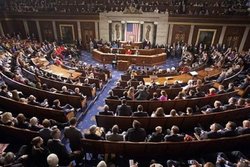 The US Senate stopped short of forming a majority required to override President Donald Trump’s veto earlier in the month of three congressional resolutions aimed at blocking the country’s arms sales to Saudi Arabia and the UAE.
The US Senate stopped short of forming a majority required to override President Donald Trump’s veto earlier in the month of three congressional resolutions aimed at blocking the country’s arms sales to Saudi Arabia and the UAE. RNA - On Monday, the chamber was set to try rendering the vetoes, which Trump issued against three congressional measures, ineffective, Reuters reported.
However, a first vote on trying to overturn one veto on a measure passed by Congress to block the sale of certain weapons to the Saudi kingdom was backed by 45 senators against 40. The Senate’s Republicans shunned the bid en masse, with only five supporting the vote. Fifteen senators, meanwhile, withheld their votes.
The vote tallies were similar in the two subsequent roll-call votes to override vetoes of the legislation blocking the additional weapons sales to Saudi Arabia, the United Arab Emirates and other countries.
The US has been supporting the Saudi-led war against Yemen that seeks to bring back the impoverished country’s former Riyadh-backed officials. The American patronage has featured aerial refueling, which the US only stopped earlier in the year after the Saudi-led coalition grew independent of it, as well as logistical and commando support. A year after the war was launched, Trump made his maiden foreign visit to Saudi Arabia, announcing more than $100 billion in arms sales to the kingdom.
Back in May, the Trump administration invoked an emergency provision of the law governing arms sales to push for the sale of $8.1 billion worth of munitions in 22 pending transfers to Saudi Arabia and the UAE and Jordan without the typical 30-day congressional review period. It claimed that the export was crucial to protect the region against what it called “the malign influence” of Iran.
In mid-April, Trump also vetoed a resolution passed by both the Senate and the House of Representatives that sought to end US involvement with the Saudi-led war in Yemen.
Saudi Arabia and a number of its regional allies launched a devastating campaign against Yemen in March 2015, with the aim of bringing the government of former Yemeni President Abd Rabbuh Mansur Hadi back to power and crushing the Ansarullah movement.
Despite Riyadh's claims that it is bombing the positions of the Ansarullah fighters, Saudi bombers are flattening residential areas and civilian infrastructures. Weddings, funerals, schools and hospitals, as well as water and electricity plants, have been targeted, killing and wounding hundreds of thousands.
According to a December 2018 report by the Armed Conflict Location and Event Data Project (ACLED), a nonprofit conflict-research organization, the Saudi-led war has claimed the lives of over 60,000 Yemenis since January 2016.
Save the Children, a charity, has reported that more than 84,700 children under the age of five may have starved to death in Yemen since the Saudi regime and a coalition of its allies launched the brutal war on the already-impoverished nation.
France, the United States, the Uinted Kingdom and some other Western countries have faced criticisms over arms sales to the Saudi Arabia and the UAE, whose aggression against Yemen has affected 28 million people and caused what the United Nations calls “one of the worst humanitarian crises in the world". According to the world body, Yemen is suffering from the most severe famine in more than 100 years.
A UN panel has compiled a detailed report of civilian casualties caused by the Saudi military and its allies during their war against Yemen, saying the Riyadh-led coalition has used precision-guided munitions in its raids on civilian targets.
847/940